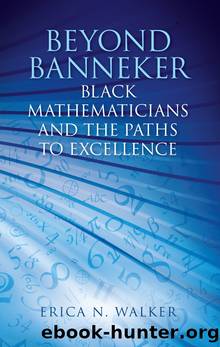Beyond Banneker by Walker Erica N.;

Author:Walker, Erica N.;
Language: eng
Format: epub
Publisher: State University of New York Press
Published: 2014-08-15T00:00:00+00:00
Navigating the Graduate School Terrain
In choosing to remain at institutions, some Black mathematicians describe the situations they face as being par for the course for [Black] graduate students in general:
Being in grad school is a very personal process, you know, like you have to give up so much of yourself, not just for the work but because they want to see if youâre okay. It takes part of you. In order for you to do well with it, you have to be motivated. If you dislike the people youâre around, youâre going to be less likely to [succeed], and I think itâs especially difficult being a Black person in this country going to graduate school, you know, the isolation and all the rest of it, and the commitment ⦠then to be isolated and have to be committed to people who make you feel funny.
This larger backdrop to the issues facing graduate students in general was a theme shared by mathematicians who had been graduate students in small and large graduate programs, northern and southern institutions, and public and private universities. As the mathematicians in the previous section stated, the culture of a graduate school mathematics program is critical to student success, even if, as in at least one case, a strong and welcoming department was not enough to make up for the racism a Black mathematician experienced on campus. What makes a âgoodâ culture in general and for Black mathematicians in particular? In many cases, predominantly White institutions that have graduated âsignificantâ numbers of Black PhDs in the sciences have committed faculty and/or administrators and/or strong alumni networks of Black graduates who share information about how to navigate the institution. Some of these institutions (Michigan and Maryland are examples) have a historical legacy, if not a reputation, for being receptive to having Black mathematics graduate students, and this is often generational in that one sees Blacks earning the PhD in mathematics from these institutions across multiple decades. In addition, Howard University has graduated a significant number of African American mathematicians since the inception of its doctoral degree program in 1975. One faculty member there, Neil Hindman, is responsible for sponsoring the largest number of Black students who have earned their PhDs in mathematics. In interviews with Black mathematicians, the role of faculty in crafting graduate school environments conducive to Black studentsâ success emerged as key.
Download
This site does not store any files on its server. We only index and link to content provided by other sites. Please contact the content providers to delete copyright contents if any and email us, we'll remove relevant links or contents immediately.
| Applied | Geometry & Topology |
| History | Infinity |
| Mathematical Analysis | Matrices |
| Number Systems | Popular & Elementary |
| Pure Mathematics | Reference |
| Research | Study & Teaching |
| Transformations | Trigonometry |
Weapons of Math Destruction by Cathy O'Neil(5082)
Factfulness: Ten Reasons We're Wrong About the World – and Why Things Are Better Than You Think by Hans Rosling(4045)
Factfulness_Ten Reasons We're Wrong About the World_and Why Things Are Better Than You Think by Hans Rosling(2764)
Descartes' Error by Antonio Damasio(2759)
A Mind For Numbers: How to Excel at Math and Science (Even If You Flunked Algebra) by Barbara Oakley(2705)
TCP IP by Todd Lammle(2659)
Applied Predictive Modeling by Max Kuhn & Kjell Johnson(2507)
Fooled by Randomness: The Hidden Role of Chance in Life and in the Markets by Nassim Nicholas Taleb(2438)
The Tyranny of Metrics by Jerry Z. Muller(2423)
The Book of Numbers by Peter Bentley(2421)
The Great Unknown by Marcus du Sautoy(2202)
Once Upon an Algorithm by Martin Erwig(2158)
Easy Algebra Step-by-Step by Sandra Luna McCune(2141)
Practical Guide To Principal Component Methods in R (Multivariate Analysis Book 2) by Alboukadel Kassambara(2105)
Lady Luck by Kristen Ashley(2087)
Police Exams Prep 2018-2019 by Kaplan Test Prep(2050)
Linear Time-Invariant Systems, Behaviors and Modules by Ulrich Oberst & Martin Scheicher & Ingrid Scheicher(1990)
All Things Reconsidered by Bill Thompson III(1968)
Secrets of Creation, Volume 1: The Mystery of the Prime Numbers by Watkins Matthew(1880)
